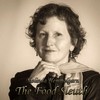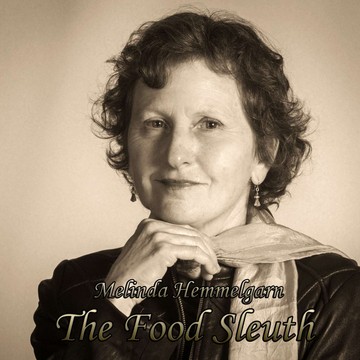

Food Sleuth Radio
Melinda Hemmelgarn
Dietitian Melinda Hemmelgarn helps listeners “think beyond their plates,” connect the dots between food, health and agriculture, and find food truth.
Episodes
Mentioned books

Oct 13, 2023 • 28min
Erica Gies, author of Water Always Wins: Thriving in an Age of Drought and Deluge
Did you know that climate change is water change? Join Food Sleuth Radio host and Registered Dietitian, Melinda Hemmelgarn, for her interview with Erica Gies, author of Water Always Wins: Thriving in an Age of Drought and Deluge. Gies, an independent journalist and National Geographic Explorer, writes extensively about water, climate change and biology. She discusses how development, climate change, and our illusion of control impact our relationship with water. She defines “slow water;” explains how and why the water we see today is not in its natural state; and supports changing how we relate to water. Related website: https://slowwater.world/

Oct 6, 2023 • 28min
Nse Witherspoon, MPH, Executive Director of the Children’s Environmental Health Network
Did you know that children’s health is dependent upon their environmental conditions? Join Melinda Hemmelgarn, Registered Dietitian and Food Sleuth Radio host for her interview with Nse Witherspoon, MPH, Executive Director of the Children’s Environmental Health Network and co-leader of the science and health arm of the Cancer Free Economy Network. Witherspoon describes the Eco-Friendly childcare initiative that protects children in daycare settings, and explains why and how protecting children from pesticides and other toxins is critical to their lifelong health and well-being. Note: October is Child Health Month; and, October 12th is Children’s Environmental Health Day. Related website: Children’s Environmental Health Network: https://cehn.org/ Cancer Free Economy Network: https://www.cancerfreeeconomy.org/

Sep 29, 2023 • 28min
Elizabeth Henderson, farmer, writer, and agrarian leader discusses food justice issues.
Did you know that agriculture is not sustainable without fair wages? Join Food Sleuth Radio host and Registered Dietitian, Melinda Hemmelgarn, for her interview with Elizabeth Henderson, award-winning farmer, writer, activist, and agrarian leader best known for her decades of support of and contributions to organic and sustainable agriculture. She is a founding member of the Northeast Organic Farming Association of New York (NOFA-NY) and has been a pioneer of the CSA model in the United States. She is committed to resisting the many injustices of a cheap food system through the power of cooperation. She’s the author of Sharing the Harvest: A Citizen’s Guide to Community Supported Agriculture; and a core leader of the Agricultural Justice Project. Related website: Agricultural Justice Project and certification: https://www.agriculturaljusticeproject.org/en/ Elizabeth Henderson papers at U. of MA – Amherst: http://findingaids.library.umass.edu/ead/mums746 Real Organic Project interview: https://www.youtube.com/watch?v=MA26cX2i9lg

Sep 22, 2023 • 28min
Amy Tamayo, J.D., National Policy and Advocacy Director at Alianza Nacional de Campesinas, Inc.
Did you know that children as young as nine years of age work in agriculture in the U.S.? Join Food Sleuth Radio host and Registered Dietitian, Melinda Hemmelgarn, for her interview with Amy Tamayo, J.D., National Policy and Advocacy Director at Alianza Nacional de Campesinas, Inc. Tamayo describes her work in which she advocates for farmworker women to advance immigration, environmental justice, and workers' rights policies. She discusses specific farmworkers’ working conditions, including heat stress and pesticide exposure. Related website: Farmworker Justice: https://www.farmworkerjustice.org/wp-content/uploads/2012/08/Reproductive-Health-Effects-of-Pesticide-Exposure.pdf Elizabeth Jaime testimonial: https://www.alianzanacionaldecampesinas.org/elizabeth-jaime-profile U.S. Equal Employment Opportunity Commission: https://www.eeoc.gov/selected-list-pending-and-resolved-cases-involving-farmworkers-1999-present

Sep 15, 2023 • 28min
Georges Benjamin, MD, Executive Director of the American Public Health Association discusses how climate changes health.
Did you know that climate change threatens public health and safety, especially for underserved and vulnerable populations? Join Food Sleuth Radio host and Registered Dietitian, Melinda Hemmelgarn, for her interview with Georges Benjamin, MD, Executive Director of the American Public Health Association. Benjamin discusses regional differences of climate impact, and describes the ways extreme weather events can affect our health. Related website: https://www.apha.org/topics-and-issues/climate-change https://www.apha.org/-/media/Files/PDF/topics/climate/Energy_Justice_Key_Concepts.ashx https://www.apha.org/Publications/Fact-Sheets

Sep 8, 2023 • 28min
Christina Campbell, Ph.D., R.D., Associate Professor in the Department of Food Science and Human Nutrition at IA State U. discusses the intersection of food and peace.
Did you know that a long-standing relationship exists between food as a political tool and the maintenance of power, and that food provides a unique opportunity to engage in peace-building? Join Food Sleuth Radio host and Registered Dietitian, Melinda Hemmelgarn, for her interview with Christina Campbell, Ph.D., R.D., Associate Professor in the Department of Food Science and Human Nutrition at IA State U. Campbell studies the intersection of food and peace and is the co-organizer of the 2023 Peace and Justice Studies Association’s annual conference. She describes how she considers food in the context of peace to foster right and just relationships with self, others, and the Earth for sustainable, resilient, and equitable food systems. Related website: https://www.peacejusticestudies.org/ Food-Peace Framework in the J Acad Nutr Diet. 2023;123(7):997-1010. https://doi.org/10.1016/j.jand.2023.02.005 Earth Charter: https://earthcharter.org/ The Waters Center for Systems Thinking: https://waterscenterst.org/

Aug 31, 2023 • 28min
Laurie Beyranevand, JD, Professor of Law and Director of the Center for Agriculture and Food Systems at the Vermont Law and Graduate School
Did you know that food is at the core of health and wellness as well as national and international security? Join Food Sleuth Radio host and Registered Dietitian, Melinda Hemmelgarn, for her interview with Laurie Beyranevand, JD, Professor of Law and Director of the Center for Agriculture and Food Systems at the Vermont Law and Graduate School, South Royalton, VT. Beyranevand discusses food law and policy, plus several of the Center’s reports, including “The State of Prison Food in New England: A Survey of Federal and State Policy” and “Exposed and At Risk: Opportunities to Strengthen Enforcement of Pesticide Regulations for Farmworker Safety .”Related website: “Hunger as a Weapon” – Global & National Security Institute:https://www.youtube.com/watch?v=skeMCnQwMPY Reports: https://www.vermontlaw.edu/academics/centers-and-programs/center-for-agriculture-and-food-systems/reports Labels Unwrapped: https://labelsunwrapped.org/

Aug 25, 2023 • 28min
Eric Hecht, MD, MPH, PhD, discusses the negative impacts of ultra-processed food on mental health.
Did you know that consuming ultra-processed foods harms both our physical and mental health? Join Food Sleuth Radio host and Registered Dietitian, Melinda Hemmelgarn, for her interview with Eric Hecht, MD, MPH, PhD, Founder and Executive Director of the Institute of Etiological Research, and author of the paper, “Cross-sectional examination of ultra-processed food consumption and adverse mental health symptoms,” published in the Journal of Public Health Nutrition. Hecht explains epidemiology, defines “ultra-processed foods,” and discusses the challenges of behavior change, as well as the multiple negative health effects of consuming ultra-processed foods.Related website: Institute of Etiological Research: https://www.etioinstitute.org; NOVA Classification of Ultra-Processed Foods: https://www.cambridge.org/core/journals/public-health-nutrition/article/un-decade-of-nutrition-the-nova-food-classification-and-the-trouble-with-ultraprocessing/2A9776922A28F8F757BDA32C3266AC2A

Aug 17, 2023 • 28min
Chef Jimmy Hill, award-winning instructor of the Food Tech training program at the Lakeland Correctional Facility in Coldwater, MI.
Did you know that incarcerated individuals who participate in Chef Jimmy Hill’s culinary training program have a 6% recidivism rate? Join Food Sleuth Radio host and Registered Dietitian, Melinda Hemmelgarn, for her interview with Chef Jimmy Hill, award-winning Executive Chef and instructor of the Food Tech training program at the Lakeland Correctional Facility in Coldwater, MI. Hill, who is featured in the James Beard Award – winning film, Coldwater Kitchen, describes his culinary program, garden, and compassionate leadership.Related website: https://www.chefjimmyleehill.com

Aug 11, 2023 • 28min
Brian Kaufman, co-director of the documentary, Coldwater Kitchen
Did you know that a film about a remarkable prison-based culinary training program won the James Beard Foundation’s Media award in 2023? Join Food Sleuth Radio host and Registered Dietitian, Melinda Hemmelgarn, for her interview with Brian Kaufman, Executive Video Producer at the Detroit Free Press and co-director of Coldwater Kitchen, the James Beard award-winning documentary featuring Chef Jimmy Hill, who runs a highly regarded culinary training program at the Lakeland Correctional Facility in Coldwater, MI. Kaufman describes his experience making a documentary film in the confines of a state prison.Related website: https://coldwaterkitchen.film/


